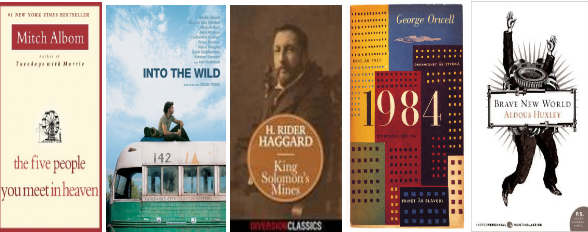OP Summer Reading Student Evaluation

September 15, 2016
Notorious among students, summer reading is considered important by teachers so that our minds don’t “rot” while our bodies decay as we waste valuable summertime.
The Five People You Meet in Heaven – Mitch Albom
Description: A horrific accident results in a jaded amusement park maintenance man’s death. The reader learns his life story through five poignant figures from his life, each provoking thought about the quality of human relationships and whether actions can be without effect.
James Kim: I enjoyed reading The Five People You Meet in Heaven very much. It has made me realize that many people can affect you: whether you have never met someone or have known someone your whole life, they can have an influence on you.
Nick Looney: The Five People You Meet in Heaven was a very moving and well thought out story. It definitely helped me grow as a person, and taught me about how life doesn’t always make sense, but everything happens for a reason.
Into the Wild – Jon Krakauer
Description: A memoir of sorts, it was not actually written by Chris McCandless but rather put together by Jon Krakauer with the help of his family members, journal entries, and newspaper articles about McCandless’s travels. The book chronicles the journey of a well-off boy who abandons what he has to discover himself, rousing fierce debate about the ethics and morality of self-fulfillment over acting for the good of others.
Jack Hillebrecht: I thought Into the Wild was decent from a story standpoint, however, I greatly disliked Chris McCandless as a character. He came off as arrogant, ungrateful, and downright moronic. I also felt that the plot was a bit muddled at times in the inclusion of author’s real-life adventures felt forced and was largely uninteresting. While there were some parallels to be drawn ultimately I didn’t feel like any of the side-stories needed to be included. During the parts that were well-written, I did find some of the ideas interesting, even if I didn’t believe in many of them. The only thing I really learned was to try and avoid becoming like this character.
Jake Nowacki: Even though I would not consider venturing into the wild like Chris McCandless, his story was inspiring. Into the Wild gave me an interesting perspective on following your personal ambitions to the greatest level. It also raised questions about whether The American Dream is what consensus has made it seem.
King Solomon’s Mines – H. Rider Haggard
Description: A Pop-culture novel from the 1880s, King Solomon’s Mines tells the story of a group of adventurers who trek through a romanticized Africa as part of a rescue mission to save one of their comrades.
Mark Miyashiro: I think King Solomon’s Mines was actually one of the better books that the school has had us read over the summer. Constant plot twists that keep the reader hooked. The book also introduced me to a sense of morals and priorities.
Jack Munro: I thought King Solomon’s Mines was a great alternative to usual summer/in class readings. It is considered old English, but it was very understandable and likeable. The characters and story were well developed and made for a great book all around.
1984 – George Orwell
Description: A novel based in a dystopian future, Orwell wrote 1984 as a cautionary tale to warn post-WWII intellectuals about the possible dangers of Communism and totalitarianism. The novel examines the mutability of objective truth, especially by those in power, and hard power compared to soft power.
Xavier Warganz: 1984 provoked much introspection about my own freedom and brought up many questions about how extensive the power of government should be.
Aidan Burrows: 1984 makes you think about the importance of language and its effect on human thought. I enjoyed the way that reality was portrayed, in that it really only exists in the human psyche. This doubt was amplified by the fact that no tangible trace existed of the foggy memories people had.
Brave New World – Aldous Huxley
Description: Another dystopian novel, the book raises questions about psychological conditioning, hedonism as a control mechanism, and whether the development of society leads to classism. The book was removed from the school reading list for the summer of 2016.
Why was Brave New World removed from the reading list?
Xavier Warganz: Brave New World was probably removed due to some of the explicit content that is throughout the book as from my experience. However, most of the class enjoyed reading the book last year.
Aidan Windorf: Brave New World deals with some sexually graphic themes which are probably the reason it was not read this year. These themes, which may be awkward at first glance, should be used as tools to decipher the author’s message and not misconstrued as grasping for attention. The book was also most likely removed as it nears a novel of ideas while venturing away from the classic plot-driven format, making it a difficult read for some.